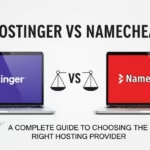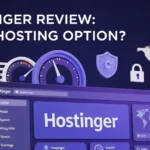Now Reading: 27 Reasons Is Namecheap Good for Domains (And a Few Things to Know)
-
01
27 Reasons Is Namecheap Good for Domains (And a Few Things to Know)
27 Reasons Is Namecheap Good for Domains (And a Few Things to Know)

Your domain name is your digital storefront. Whether you’re starting a blog, launching a business, or building a personal portfolio, choosing the right domain registrar can mean the difference between a smooth online experience and ongoing headaches. Many people find themselves asking, “is Namecheap good for domains?”—and it’s a fair question.
With so many options out there—GoDaddy, Google Domains, Bluehost—Namecheap has emerged as a favorite among entrepreneurs, developers, and digital marketers. But why? Is it just the low prices, or is there more to this company than meets the eye?
Let’s dig into everything you need to know about Namecheap, and by the end of this article, you’ll know exactly why Namecheap is good for domains—or if it’s not the right fit for your needs. If you’re also wondering Is Namecheap Hosting Secure, we cover that in detail to help you make a fully informed decision.
What Is Namecheap?
History and Background of Namecheap
Founded in 2000 by Richard Kirkendall, Namecheap started with a simple goal: to make domain registration affordable and accessible. Over the years, they’ve expanded into web hosting, VPN services, and email—but domains remain their core strength.
Core Services Offered
- Domain Registration (.com, .net, .org, and 1000+ TLDs)
- WHOIS Privacy
- Web Hosting (Shared, VPS, Dedicated)
- SSL Certificates
- Email Hosting
- VPN and Security Tools
But let’s focus on the real question: is Namecheap good for domains when compared to its competitors?
Is Namecheap Good for Domains?
Expert Summary for Busy Readers
If you’re short on time, here’s the bottom line: Yes, Namecheap is very good for domains—especially if you value affordability, privacy, and ease of use.
What Makes a Domain Registrar “Good”?
- Transparent pricing
- Free WHOIS protection
- Easy-to-use dashboard
- Reliable support
- No aggressive upselling
Namecheap ticks all these boxes, and often outperforms more popular but pricier registrars like GoDaddy.
Namecheap Pricing: Affordable or Overrated?
.com, .org, and Other TLD Pricing
One of the biggest reasons people ask “is Namecheap good for domains” is because of its pricing. Here’s what you can expect:
| TLD | Registration Price | Renewal Price | WHOIS Privacy |
| .com | $9.48 | $14.58 | Free forever |
| .net | $10.98 | $14.98 | Free forever |
| .org | $7.98 | $13.98 | Free forever |
Renewal Rates and Upsells
Unlike other registrars, Namecheap keeps renewal prices relatively fair and doesn’t hide them in fine print. Their upsells are soft and optional, making the experience less frustrating.

User Interface & Domain Management Dashboard
Domain Search Functionality
Their ‘Beast Mode’ search feature simplifies the process of generating ideas and checking domain availability in bulk. A major win for agencies and developers.
Domain Settings and DNS Management
Whether you’re forwarding domains, adding custom DNS records, or connecting to Cloudflare, Namecheap’s dashboard is intuitive—even for beginners.
Customer Support: How Reliable Is Namecheap?
Live Chat, Tickets & Knowledge Base
Support is available 24/7 through live chat, and their agents are surprisingly knowledgeable about both technical and general inquiries.
Community Reputation and Ratings
Many users on Reddit and Trustpilot say the same thing: “I switched because Namecheap has better support than GoDaddy.”
So again, is Namecheap good for domains? Yes—especially when support matters.
Domain Privacy & WHOIS Protection
Free WHOIS Privacy Forever
This is a huge deal. Most registrars charge extra for WHOIS privacy—Namecheap includes it for free for the life of your domain.
How It Compares with Other Registrars
| Registrar | WHOIS Privacy Cost |
| Namecheap | Free Forever |
| GoDaddy | $9.99/year |
| Google Domains | Free |
| Bluehost | $15/year |
This feature by itself settles the debate—Namecheap is definitely a solid choice for domain services, and it’s even more appealing when paired with Namecheap WordPress Hosting for those looking to build a website with ease.

Security Features for Your Domain
2FA, SSL, and Domain Locking
Namecheap offers robust security through features like two-factor authentication (2FA), domain locking, and seamless SSL certificate integration.
Abuse and Account Recovery Policies
Namecheap responds quickly to domain abuse reports and has a robust process for account recovery.
Ease of Use: Beginner-Friendly or Techie-Only?
The dashboard is so user-friendly that even first-timers can register and manage domains with zero confusion. Advanced users will appreciate the API access and detailed DNS controls.
Is Namecheap Good for Domains Long-Term?
Reliability of Renewals
You’ll get plenty of reminders before your domain expires, and the auto-renew system is dependable.
Domain Transfers In/Out
Transferring domains to or from Namecheap is smooth, with no hidden fees or complicated barriers.
Upsells and Ads: Is Namecheap Too Pushy?
Add-ons, Hosting, and Email Marketing
Yes, they offer hosting, email services, and VPNs—but they’re never aggressive about pushing them. You can simply skip them during checkout.
Namecheap’s Extra Features You Might Love
Beast Mode Domain Search
Search up to 5,000 domains in bulk with filters like keyword position, domain extension, and price.
Domain Marketplace
Buy or sell domains directly on Namecheap’s marketplace—a great place to find expired gems.
Deep Dive: Technical Aspects of Namecheap Domain Services
DNS Management and Customization
One of the reasons people wonder is Namecheap good for domains is because they want control over their domain settings—and Namecheap delivers. It allows full DNS management, including:
- Custom nameserver settings
- Adding A, CNAME, MX, TXT, and SRV records
- DNSSEC (Domain Name System Security Extensions)
This level of customization is not only appreciated by developers and tech-savvy users but also simplifies tasks like setting up third-party email services, redirecting traffic, or connecting to CDNs like Cloudflare.
Advanced Tools for Developers
If you’re a developer or tech entrepreneur, you’ll be pleased to know that Namecheap offers:
- API access for bulk domain management
- DNS templates for rapid setup
- Real-time propagation for DNS updates
These are the kinds of features that solidify the answer to is Namecheap good for domains with a resounding “yes” for developers.
Namecheap’s Mobile App Experience
With mobile technology at the forefront, having the ability to handle domain management anytime, anywhere is vital. Namecheap’s mobile app (available on iOS and Android) offers a smooth experience. From checking domain status to renewing or updating DNS records, everything is just a tap away.
It’s rare for a domain registrar to invest this much in mobile UX, but Namecheap’s app ensures you’re never tied to your desk—yet another reason why the answer to is Namecheap good for domains keeps trending positive.
Domain Auctions and Aftermarket: A Hidden Gem

If you’re interested in buying expired or premium domains, Namecheap’s Domain Marketplace is worth exploring. Here’s what makes it special:
- Easy to list or purchase premium domains
- No crazy auction fees like other platforms
- Integrated directly into your Namecheap dashboard
You don’t have to juggle multiple services—buy, manage, and sell all in one place.
This convenience adds another tick in the “yes” column for is Namecheap good for domains—especially for investors and domain flippers.
Uptime and Reliability of Domain Services
Domain registrars don’t just sell you names—they’re responsible for maintaining uptime so your domain resolves reliably. Namecheap has a reputation for robust infrastructure, with 99.9% uptime for DNS services.
Their DNS servers are globally distributed, reducing latency and ensuring fast domain resolution regardless of where your visitors come from.
Green Hosting and Ethical Business Practices
Many users care about the ethics of the companies they work with. Does Namecheap uphold ethical standards when it comes to domain services?
Here’s what stands out:
- Advocates for online privacy and net neutrality
- Supports non-profits and open internet initiatives
- Doesn’t upsell aggressively or trap you in hidden contracts
Their CEO has repeatedly voiced support for internet freedom, and Namecheap’s transparency policies reflect that. If you’re curious about their cost structure, we’ve also covered Namecheap Hosting Pricing to help you understand exactly what you’re paying for.
Scalability for Growing Businesses
Namecheap delivers smooth, reliable scalability tailored to your growth.ebsite or 500, Namecheap scales beautifully:
- Bulk management tools
- Multi-domain dashboard filters
- Unified billing and reporting
If your business is expanding, you won’t need to switch registrars—Namecheap can handle the growth.
That’s one more powerful reason to say “yes” when asked is Namecheap good for domains for long-term projects.
SEO and Domain Impact
Search engines don’t directly rank domains based on the registrar, but factors like WHOIS privacy, domain uptime, and DNS speed do influence SEO indirectly.
Namecheap supports:
- Fast DNS propagation
- Reliable uptime
- WHOIS protection to reduce spam and protect brand identity
All of these contribute to a healthier site environment, boosting SEO indirectly. So, if you’re an SEO consultant or online business owner, the answer to is Namecheap good for domains still remains favorable.
Educational Resources and Learning Support
Are you new to domains? Namecheap’s Knowledge Base is extensive. It includes:
- Step-by-step guides
- Video tutorials
- Domain strategy articles
They also offer a blog that covers branding, marketing, and tech tutorials—ideal for beginners and pros alike.
When you ask is Namecheap good for domains, don’t forget to factor in how much they educate their users.
Real-World Use Cases: Who Benefits Most from Namecheap?
Here are a few personas that benefit heavily from using Namecheap:
| User Type | Why It Works |
| Freelancers | Low costs, easy management, and strong privacy features |
| Startups | Scalability and domain bundles to launch fast |
| Agencies | Bulk tools, API access, and DNS templates |
| Bloggers | Affordable domains and reliable uptime |
| Marketers | Built-in marketplace and email services |
Each of these users can confidently answer is Namecheap good for domains with a “yes” that’s backed by performance.
How to Register a Domain on Namecheap in 5 Steps
For readers who are ready to try Namecheap, here’s how simple it is:
- Visit Namecheap.com
- Use the domain search bar or Beast Mode
- Choose your domain and add it to cart
- Create an account and complete checkout
- Your domain is live within minutes (WHOIS privacy enabled by default)
Ease of onboarding is another reason people say Namecheap is good for domains—especially if it’s your first time.
Why Some Users Leave Namecheap (And Why Most Come Back)
No company is perfect. Some common complaints include:
- No phone support (chat and email only)
- Slightly slower domain propagation during peak hours
- Some hosting packages aren’t as competitive
However, many users who leave end up returning. Why? Because the pricing, transparency, and reliability of Namecheap for domain registration are hard to beat.
Global Reach and Supported TLDs
Namecheap supports over 1,500+ domain extensions, from classic .com and .org to newer ones like:
- .ai for tech startups
- .shop for e-commerce sites
- .co for professional portfolios
- .tech, .xyz, .dev and more
So if you’re targeting a global audience or want a unique brand identity, Namecheap gives you the tools—another clear “yes” for is Namecheap good for domains in niche markets.
Data Protection and Compliance
With increasing concerns about GDPR and data privacy, Namecheap ensures:
- GDPR compliance for EU users
- Optional 2FA and security alerts
- Account-level password recovery and security PINs
Their strong stance on digital rights reinforces the fact that Namecheap is good for domains when privacy is a priority.
Summing It Up: Is Namecheap Good for Domains in 2025?
Let’s recap the core reasons why the answer to is Namecheap good for domains is a strong “yes” in 2025 and beyond:
- Affordable and transparent pricing
- Free WHOIS privacy (for life)
- Easy-to-use interface
- Developer tools and API
- Responsive 24/7 support
- Ethical business model
- Strong DNS and security infrastructure
- Ideal for beginners and power users alike
With all these strengths, Namecheap remains one of the top-rated domain registrars globally. It’s especially appealing to cost-conscious users who don’t want to sacrifice performance or support.
Comparing Namecheap vs Competitors
Namecheap vs GoDaddy
- Lower prices
- Free WHOIS privacy
- Cleaner dashboard
- Less upselling
Namecheap vs Google Domains
- Google is exiting the domain business (sold to Squarespace)
- Namecheap remains independent and focused
Who Should Use Namecheap for Domains?
Best Fit for Beginners, Freelancers, and SMBs
If you’re launching a startup, building a personal brand, or running a small business, Namecheap is an ideal fit.
Pros and Cons of Using Namecheap
Pros:
- Affordable pricing
- Free WHOIS privacy
- Easy-to-use interface
- Reliable support
Cons:
- No phone support
- Hosting is average (but improving)
What Real Users Are Saying
Trustpilot, Reddit, and Twitter Reviews
“Is Namecheap good for domains? I’ve used them for 7 years and never had a single issue.” – Reddit user
“Affordable, secure, and great support. I moved all my domains here.” – Trustpilot review
FAQs About Namecheap as a Domain Registrar
- Is Namecheap good for domains compared to GoDaddy?
Yes, it’s generally more affordable, has free WHOIS privacy, and a cleaner interface.
- Is Namecheap good for domains for beginners?
Absolutely. Their platform is very beginner-friendly.
- Does Namecheap upsell a lot like GoDaddy?
No, their checkout process is simple with minimal upselling.
- Can I trust Namecheap with domain security?
Yes, it offers SSLs, 2FA, and domain locking to keep your domains secure.
- How fast is Namecheap’s customer support?
Live chat is available 24/7 and most users report fast resolution.
- Is Namecheap good for domains with multiple extensions?
Yes, their bulk tools and TLD support are ideal for buying domains at scale.
Finally: Is Namecheap Good for Domains in 2025 and Beyond?
After diving deep into features, pricing, support, and real user reviews, it’s clear: Namecheap is good for domains—and not just good, but one of the best choices for most users.
Whether you’re buying your first domain or managing a portfolio of 1000+, Namecheap offers reliability, affordability, and trust that few can match.


















